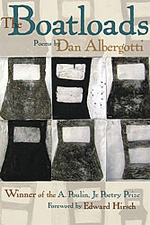CRAIG BEAVEN
Review | The Boatloads, by Dan Albergotti
 |
|
| BOA Editions Limited, 2008 |
The concept of the Poet-Priest is an old one. We generally use the title to describe those poets who seem to be attuned to a higher order, a higher sight or way of seeing that goes beyond the mundane. These poets often have a spiritual bent to their work, seeing the sacred among the events of the everyday.
Dan Albergotti has taken this concept of the Poet-Priest to its logical, twenty-first-century conclusion. This isn’t to say Albergotti is a priest, that he adheres to a specific dogma, or that he has taken vows of any sort (other than, likely, the de facto vow of poverty all poets take). It means simply that he sees religious beauty and scale in the secular, finds the strange, mystical, magical, unreal, and surreal in the life we all move through and engage. The poems here position the speaker as one who, like Moses, is gifted with a kind of second sight, who can see things that others cannot, and whose burden it is to bring these visions back to us, relay them in all their mystery and wonder.
Appropriately, the book begins with “Vestibule,” where the speaker recounts making love in an empty church. Here, the physical act of love was more than the biology of intercourse; it “preached a quiet sermon / not just on the divinity of skin, but on the grace / of the heart beneath.” Because the poem is written after the Language poets and postmodernism, the speaker/poet must tip his hat to those who would scorn such grandiose visions, and he acknowledges that many readers would find this image hyperbolic. Such is the dilemma of the poet who can see and hear the spiritual life that goes on around us, often unnoticed. “And if you say sentiment and cliché, then that / is what you say. What I know is what is sacred.” “Vestibule” is a preview of the bold poems that will follow, the entryway to the larger cathedral inside. The speaker knows he will be called crazy by many, but he sticks to his guns and images unapologetically, demanding that his way of seeing is as valid (and true) as any other.
Pews, hymns, lots and lots and lots of references to God—some readers may be wary of such close adherence to religion and religious objects and materials. Albergotti never preaches, only seeks, and the emphasis on the spiritual never overwhelms the power of poetry. A piece titled “Song of the Gods” begins with the drama and lyricism of the lines “We live in the light, unbeheld, / in morning glare and the low rays // of evening.” That kind of high tone is everywhere in the book, making for a poetry that feels larger than most being written today. Even as the poems move through the everyday—having drinks with parents, watching a squirrel die, remembering a grandmother, recalling a boy who burns his toy soldiers—the tone and elevated style always lift the poem into a sphere of higher art and utterance, a speech beyond speech that is a purer record of human thought, consciousness, and knowledge. In “Lesson of the Elements: Fire,” the flame that melts a child’s army toys is, years later, those other flames that have burned through the centuries:
We say Ilium and auto-da-fé,
napalm and Nagasaki. Our words are like tonguesof flame atop toy soldiers, consuming us as soon
as we utter them. We speak swirls of fiery stars
back at the cosmos. Our words make flames riselike the screams of victims or like the body
of a god ascending into heaven. We say
Alpha and Omega, one and another word of the fire.
In the context of the larger book, this flame can only recall the burning bush that speaks to Moses and the tongues of fire that appeared on the heads of the Apostles when they began to speak in tongues. Here, the method of the text is laid bare: the thinking and seeing take us through ages, places, people, and into the heavens, transforming flame and word and tongue into things that are themselves and greater, bigger versions of themselves. The magic of this book lies in the consistent, awe-inducing leaps and images that Albergotti makes, poem after poem, page after page. Call Albergotti’s style here a religious vernacular, a style of poetry that captures the day-to-day experience, infused with grandeur, awe, time, history, and the eternal.
Another approach to the mystical is evident in poems like “Methuselah Dead” and “Things to Do in the Belly of the Whale,” which literalize and humanize the stories from the Bible, finding humor and connections between the present and ancient biblical events and characters. Likewise, the recurring, numbered poems called “Songs” recall both the book of Psalms and the songs of lamentation and praise that the Psalms derive from, as well as often sampling from the longing-lyrics of a pop song from the radio. In these contexts, Albergotti both humanizes the grandness and largeness of the Bible and connects our human experience to a greater, spiritual one.
Perhaps the “faith” of the book is just that the world is beautiful, contains the possibility for greatness and wonder, that this world opens to other deeper, better worlds right before us. We need a Poet-Priest like Albergotti to show us that world, to conjure it and lead us through it, ferry us across, like his own Charon, mysteries and all. And that is what The Boatloads does remarkably. ![]()
Dan Albergotti’s chapbook, Charon’s Manifest, won the 2005 Randall Jarrell/Harperprints Chapbook Competition. His work has appeared in numerous journals, including Shenandoah, The Southern Review, and The Virginia Quarterly Review. He currently edits the online journal Waccamaw and teaches creative writing and literature at Coastal Carolina University.